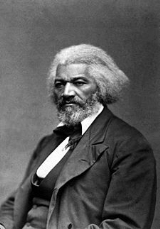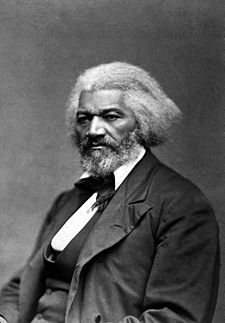
Freedman's Savings Bank
Encyclopedia
The Freedman's Saving and Trust Company, popularly known as the Freedman's Savings Bank, was a financial organization created by the U.S. government to encourage and guide the economic development of the newly-emancipated African-American communities in the post-Civil War
period. Although functioning only between 1865 and 1874, the company achieved notable successes as a leading financial institution of African-Americans. Its archives are valued as an exhaustive collection of information regarding the African American community and its socio-economic life in the immediate aftermath of emancipation
.
and forced labor in the South. To help alleviate the socio-economic condition of the community, the Republican
-controlled U. S. Congress established the Freedman's Bureau and passed an act of incorporation
and a charter for the Freedman's Saving and Trust Company, which was signed into law by President Abraham Lincoln
on March 3, 1865. Originally headquartered in New York City
, the first branch of the company opened in Baltimore, Maryland. By 1866, the bank had established 19 branches in 12 states, mainly in the South. The national headquarters was shifted to Washington, D.C.
in 1867.
 The company was created specifically as a repository
The company was created specifically as a repository
for African-American veterans, ex-slaves and their families to build their savings, but it also enabled numerous community organizations to increase their financial strength and thus, expand their activities. The company attracted a large number of societies, churches, charities and other private organizations that opened accounts and established trusts with the company. With the assistance of the company, numerous hospitals, schools and institutions such as the St. Elizabeth Home for Colored Children and the St. Francis Xavier Church's Orphan Aid Society were established. Noted community leaders and civil rights activists formed the management of several trusts and held other important positions in the bank. A large number of African American soldiers and veterans of the Civil War held savings accounts in the banks; the management of their funds was organized through an allotment system supervised by the officers of the respective army regiments.
The surviving documentation and papers of the bank archives illuminate the names, whereabouts and other relevant information about the veterans of the 7th Regiment United States Colored Troops and their transactions with the bank; the data is considered historically important in the study of African-American history. The bank's records of 480,000 names, estimated to be the largest single repository of lineage-linked African-American records, has been indexed by the Church of Jesus Christ of Latter-day Saints. The searchable database is available to amateur as well as professional genealogists. At the height of its success, the Freedman's Savings Bank held assets worth more than $3.7 million.
American Civil War
The American Civil War was a civil war fought in the United States of America. In response to the election of Abraham Lincoln as President of the United States, 11 southern slave states declared their secession from the United States and formed the Confederate States of America ; the other 25...
period. Although functioning only between 1865 and 1874, the company achieved notable successes as a leading financial institution of African-Americans. Its archives are valued as an exhaustive collection of information regarding the African American community and its socio-economic life in the immediate aftermath of emancipation
Emancipation Proclamation
The Emancipation Proclamation is an executive order issued by United States President Abraham Lincoln on January 1, 1863, during the American Civil War using his war powers. It proclaimed the freedom of 3.1 million of the nation's 4 million slaves, and immediately freed 50,000 of them, with nearly...
.
Establishment
Following the end of the American Civil War, the poor economic condition of the newly-emancipated negroes (often called Freedmen at the time) was aggravated by the economic devastation of the Southern states. The emancipated peoples had few economic resources or capital and little experience or exposure to private enterprise. Many soon fell into sharecroppingSharecropping
Sharecropping is a system of agriculture in which a landowner allows a tenant to use the land in return for a share of the crop produced on the land . This should not be confused with a crop fixed rent contract, in which a landowner allows a tenant to use the land in return for a fixed amount of...
and forced labor in the South. To help alleviate the socio-economic condition of the community, the Republican
Republican Party (United States)
The Republican Party is one of the two major contemporary political parties in the United States, along with the Democratic Party. Founded by anti-slavery expansion activists in 1854, it is often called the GOP . The party's platform generally reflects American conservatism in the U.S...
-controlled U. S. Congress established the Freedman's Bureau and passed an act of incorporation
Incorporation (business)
Incorporation is the forming of a new corporation . The corporation may be a business, a non-profit organisation, sports club, or a government of a new city or town...
and a charter for the Freedman's Saving and Trust Company, which was signed into law by President Abraham Lincoln
Abraham Lincoln
Abraham Lincoln was the 16th President of the United States, serving from March 1861 until his assassination in April 1865. He successfully led his country through a great constitutional, military and moral crisis – the American Civil War – preserving the Union, while ending slavery, and...
on March 3, 1865. Originally headquartered in New York City
New York City
New York is the most populous city in the United States and the center of the New York Metropolitan Area, one of the most populous metropolitan areas in the world. New York exerts a significant impact upon global commerce, finance, media, art, fashion, research, technology, education, and...
, the first branch of the company opened in Baltimore, Maryland. By 1866, the bank had established 19 branches in 12 states, mainly in the South. The national headquarters was shifted to Washington, D.C.
Washington, D.C.
Washington, D.C., formally the District of Columbia and commonly referred to as Washington, "the District", or simply D.C., is the capital of the United States. On July 16, 1790, the United States Congress approved the creation of a permanent national capital as permitted by the U.S. Constitution....
in 1867.
Function

Repository (publishing)
A repository in publishing, and especially in academic publishing,is a real or virtual facility for the deposit of academic publications, such as academic journal articles....
for African-American veterans, ex-slaves and their families to build their savings, but it also enabled numerous community organizations to increase their financial strength and thus, expand their activities. The company attracted a large number of societies, churches, charities and other private organizations that opened accounts and established trusts with the company. With the assistance of the company, numerous hospitals, schools and institutions such as the St. Elizabeth Home for Colored Children and the St. Francis Xavier Church's Orphan Aid Society were established. Noted community leaders and civil rights activists formed the management of several trusts and held other important positions in the bank. A large number of African American soldiers and veterans of the Civil War held savings accounts in the banks; the management of their funds was organized through an allotment system supervised by the officers of the respective army regiments.
The surviving documentation and papers of the bank archives illuminate the names, whereabouts and other relevant information about the veterans of the 7th Regiment United States Colored Troops and their transactions with the bank; the data is considered historically important in the study of African-American history. The bank's records of 480,000 names, estimated to be the largest single repository of lineage-linked African-American records, has been indexed by the Church of Jesus Christ of Latter-day Saints. The searchable database is available to amateur as well as professional genealogists. At the height of its success, the Freedman's Savings Bank held assets worth more than $3.7 million.
External links
- Freedman's Savings and Trust Company Records describes the records, their value to genealogists, lists individual branch locations, and shows where the records of 61,131 depositors (and about 420,000 associates) are found on the Internet.

